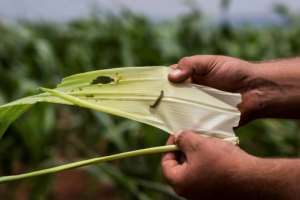
The Crops Research Institute of the Council for Scientific and Industrial Research (CSIR-CRI), is developing an integrated agro-system to detect and manage fall armyworm (FAW) infestation in maize production in Ghana.
The two-year project, dubbed 'Push and Pull', is a collaborative work of the CRI and the Institute and Alliance for a Green Revolution in Africa (AGRA).
It is part of a national agenda to improve significantly, maize cultivation, which accounts for more than fifty (50) per cent of the country's total cereal production.
Dr. Stella Ama Ennin, Director of the Institute, speaking to the Ghana News Agency (GNA), at Fumesua, in the Ejisu municipality after an inspection of the project, said the initiative was to bolster food security, while addressing the devastating effects of the FAW infestation.
The concept involves setting up pheromone traps as soon as maize is planted to detect the adult pest, a monitoring system is, then, put in place to search for eggs, larvae or maize plants showing signs of infestation.
Subsequently, all affected plants are then dealt with, using the right and recommended treatment formulae, including insecticide sprays.
The pests detected about two years ago, had since rapidly spread, causing destruction to more than 18, 000 hectares of maize.
Dr Ennin indicated that the green-striped caterpillar larvae of moths were devastating, because they tended to eat the reproductive parts of the plant and leaves.
'CSIR-CRI being a member of the national taskforce to address the FAW infestation, would not relent in finding a remedy to keep farmers in business in order to improve their livelihood', she told the GNA.
The Institute, the foremost crops research-based establishment in sub-Saharan Africa had recently, been advocating the development and use of genetically-modified (GM) maize to stop the FAW infestation.
Research scientists attached to the CRI's Biotechnology Research Programme (BRP) have argued that, genetically-modified maize with in-built disease-resistant genes had the potential to withstand the harmful effects of the pests.
In the western hemisphere, the most effective solution to contain this pest is still the use of transgenic plant varieties.
Stakeholders, ranging from agricultural researchers and scientists, farmers, plant breeders, farmers and food processors, traditional authorities, as well as agro industries took part in the inspection of the project.
The field trip was to keep the participants abreast with some of the CRI's implementing projects on its farm stations, and how they related to the overall agricultural agenda of the nation.
It was in tandem with activities marking the sixty (60) years anniversary of the CSIR, and coincided with the 'CRI 2018 Open Day'.
GNA
By Stephen Asante, GNA




 Lay KPMG audit report on SML-GRA contract before Parliament – Isaac Adongo tells...
Lay KPMG audit report on SML-GRA contract before Parliament – Isaac Adongo tells...
 Supervisor remanded for stabbing businessman with broken bottle and screwdriver
Supervisor remanded for stabbing businessman with broken bottle and screwdriver
 NDC watching EC and NPP closely on Returning Officer recruitment — Omane Boamah
NDC watching EC and NPP closely on Returning Officer recruitment — Omane Boamah
 Your decision to contest for president again is pathetic – Annoh-Dompreh blasts ...
Your decision to contest for president again is pathetic – Annoh-Dompreh blasts ...
 Election 2024: Security agencies ready to keep peace and secure the country — IG...
Election 2024: Security agencies ready to keep peace and secure the country — IG...
 People no longer place value in public basic schools; new uniforms, painting wil...
People no longer place value in public basic schools; new uniforms, painting wil...
 'Comedian' Paul Adom Otchere needs help – Sulemana Braimah
'Comedian' Paul Adom Otchere needs help – Sulemana Braimah
 Ejisu by-election: Only 33% of voters can be swayed by inducement — Global InfoA...
Ejisu by-election: Only 33% of voters can be swayed by inducement — Global InfoA...
 Minority will expose the beneficial owners of SML, recover funds paid to company...
Minority will expose the beneficial owners of SML, recover funds paid to company...
 Prof. Opoku-Agyemang has ‘decapitated’ the NPP’s strategies; don’t take them ser...
Prof. Opoku-Agyemang has ‘decapitated’ the NPP’s strategies; don’t take them ser...
